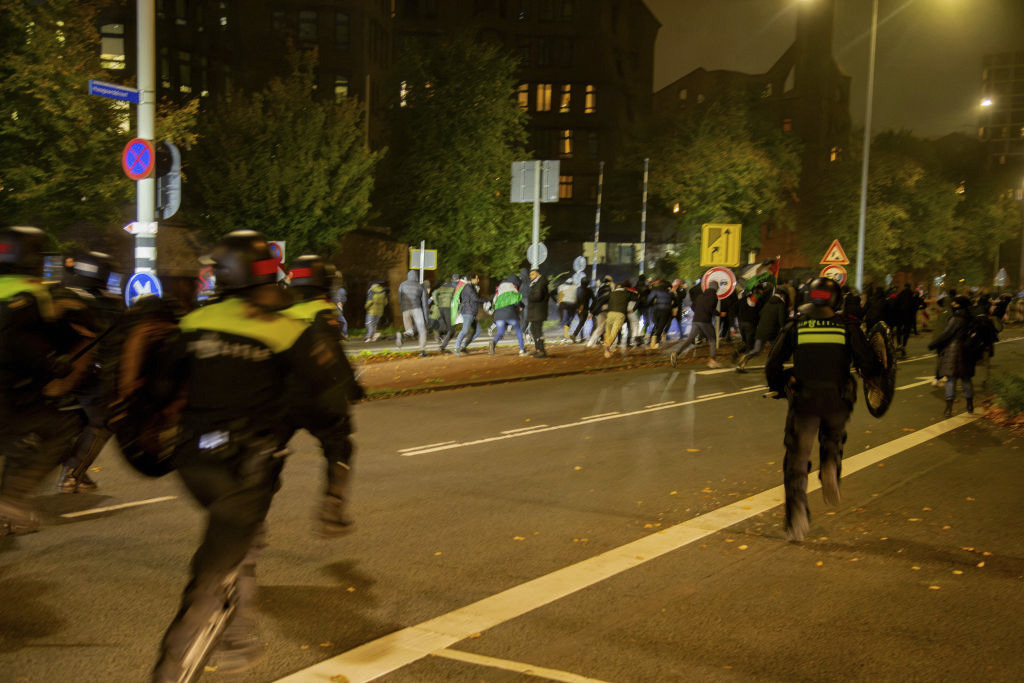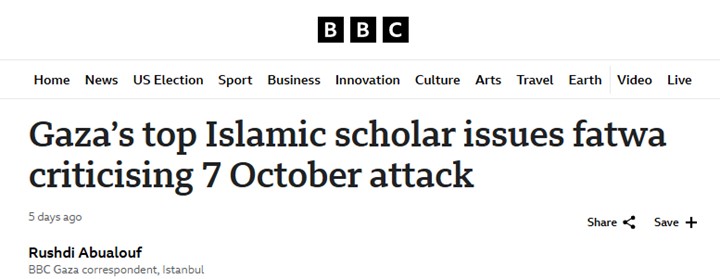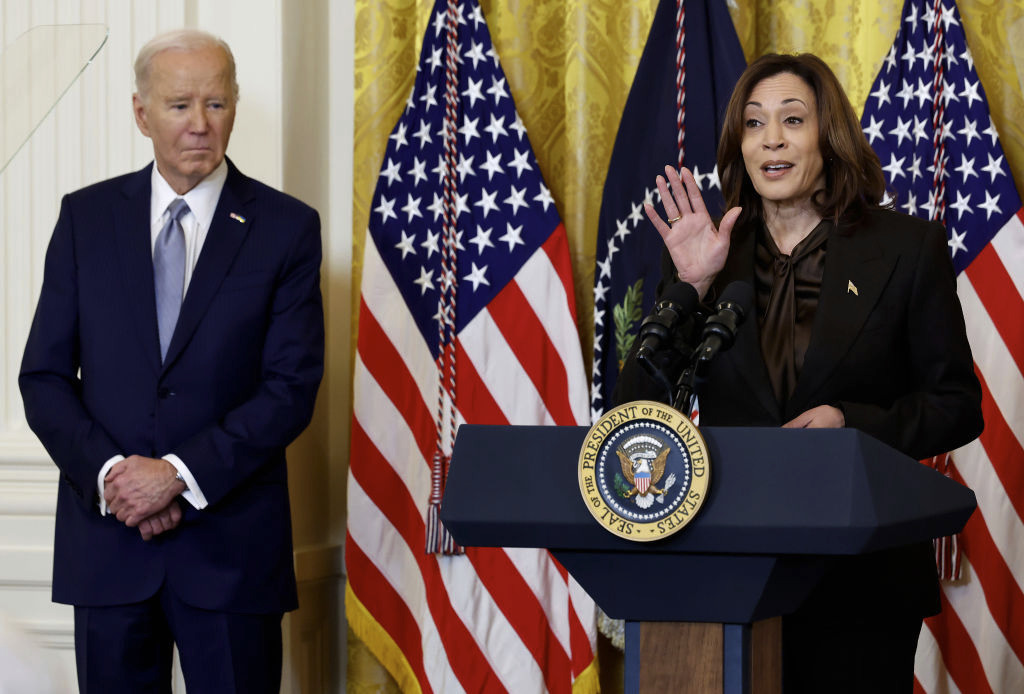by JNS Staff
Rafael Grossi met with the Iranian foreign minister, who said that the government is willing to resume nuclear talks, but not "under pressure and intimidation."
 |
Iran's head of the Atomic Energy Organization
Mohammad Eslami (right) and the United Nations nuclear chief Rafael
Grossi give a joint press conference in Tehran on Nov. 14, 2024. Photo
by Atta Kenare/AFP via Getty Images. |
International Atomic Energy Agency
Director Rafael Grossi cautioned on Thursday against striking Iran’s
nuclear sites, after Israel’s Defense Minister Israel Katz suggested
they may be targeted.
“I say this with regards to Iran …,
nuclear installations should not be attacked,” Grossi said during a news
conference in Tehran, according to AFP.
Katz
said on Monday that Iran was “more exposed than ever to strikes on its
nuclear facilities. We have the opportunity to achieve our most
important goal—to thwart and eliminate the existential threat to the
State of Israel.”
Jerusalem is believed to have knocked out
the Islamic Republic’s air defenses during its attack on Oct. 26,
leaving the country’s nuclear facilities vulnerable.
Israeli Prime Minister Benjamin Netanyahu
reportedly held back from attacking Iran’s nuclear sites due to pressure
from the Biden administration. On the campaign trail in early October, a
month before being reelected as U.S. president, Donald Trump said that
Israel should strike Iran’s nuclear facilities in response to Tehran’s
Oct. 1 ballistic missile attack on the Jewish state.
Jerusalem views a nuclear Iran as an existential threat.
Grossi was in Iran for his first visit to the country since May.
Iran’s official IRNA news agency said that he was expected “to negotiate with the country’s top nuclear and political officials.”
“Started my two-day visit to Iran with an indispensable meeting with Iranian Foreign Minister Abbas Araghchi,” tweeted Grossi.
For his part, Araghchi described the talks
as “important and straightforward,” adding that Iran is a committed
member of the nuclear Non-Proliferation Treaty (NPT) and will continue
to fully cooperate with the IAEA.
“Differences can be resolved through
cooperation and dialogue. We agreed to proceed with courage and good
will. Iran has never left the negotiation table on its peaceful nuclear
program. The ball is in the EU/E3 court. Willing to negotiate based on
our national interest & our inalienable rights, but NOT ready to
negotiate under pressure and intimidation,” Araghchi tweeted.
Grossi also reportedly met the head of
Iran’s Atomic Energy Organization, Mohammad Eslami, and was expected to
later meet with Iranian President Masoud Pezeshkian.
Furthermore, Grossi said that he would
visit the Fordo and Natanz uranium enrichment sites on Friday to assist
in giving him “a full picture” of the country’s nuclear program.
“Tomorrow will be a very important step in
my visit this time, since I am going to be visiting important
facilities in Fordo and Natanz, which are also going to help me in
having a full picture of the evolution of the program,” the IAEA chief
said alongside Araghchi.
In his remarks to AFP on Tuesday, Grossi said he expects to work together with President-elect Trump on the issue.
“I already worked with the first Trump administration and we worked well together,” the IAEA chief said.
During his first term in 2018, Trump
pulled the United States out of the 2015 JCPOA nuclear deal with Iran
and stepped up sanctions on the regime in Tehran.
The president-elect plans to renew his
“maximum pressure” policy on Iran when he returns to the White House on
Jan. 20, including issuing punishing sanctions and targeting Tehran’s
oil income.
Sources briefed on Trump’s early plans told The Wall Street Journal on
Friday that the harsh measures against the regime are part of an
aggressive strategy to weaken the Islamic Republic’s support for its
regional terrorist proxies and significantly harm its nuclear ambitions.
Former Trump officials said that his approach to Iran will likely be influenced by its attempt to assassinate him. The U.S. Department of Justice charged three men on Friday who it said were involved in the Iranian plot.
Trump and Netanyahu “see
eye-to-eye on the Iranian threat in all its aspects,” the Israeli
premier said on Sunday following phone calls with the American.
“In recent days, I have spoken three times
with U.S. President-elect Donald Trump,” Netanyahu revealed in a
written statement published by the Prime Minister’s Office on Sunday
afternoon.
The “very good and important talks” were meant to “further enhance the steadfast bond” with Washington, he said.
“We see eye-to-eye on the Iranian threat
in all its aspects and on the dangers they reflect,” Netanyahu said. “We
also see the great opportunities facing Israel, in the area of peace
and its expansion, and in other areas.”
Tehran has the capacity to produce nuclear weapons should it choose to do so, an adviser to Iranian Supreme Leader Ali Khamenei said on Nov 1.
“We now have the technical capabilities necessary to produce nuclear weapons,” Kamal Kharrazi told the Hezbollah-affiliated Al-Mayadeen outlet.
“Only the supreme leader’s fatwa currently
prohibits it,” he said, referring to a religious ruling made by Iranian
leader Ayatollah Ali Khamenei in the mid-’90s.
“If the survival of Iran comes under serious threat, we reserve the right to reconsider,” added Kharrazi.
In May, Kharrazi told the ISNA news
agency, “If the Zionist regime dares to damage Iran’s nuclear
facilities, our level of deterrence will be different. We have no
decision to produce a nuclear bomb, but if the existence of Iran is
threatened, we will have to change our nuclear doctrine.”
The Iranian nuclear program is the greatest threat facing the Jewish state, Israeli Foreign Minister Gideon Sa’ar told the press on Monday.
“The most crucial issue for the future of
our region and the security of Israel is to prevent Iran from acquiring
nuclear weapons,” he said.
“The most important issue by far for the
future of this region and the security of the State of Israel is to
avoid Iran getting a nuclear weapon,” Sa’ar stated, adding that he was
confident that Israel and the United States would work together to
stabilize the region.
A nuclear Iran poses a threat to the entire region, he said.
“Iran attacks other neighbors, [it]
attacked the Saudis, for example. Iran is directly connected, financing
and instructing and responsible for so many terror organizations, some
of them became terror states in the region,” he noted.
The IAEA reports that Iran’s enriched
uranium stockpile has now reached 60% purity, nearing the 90% threshold
needed for nuclear weapons.
JNS Staff
Source: https://www.jns.org/iaea-chief-irans-nuclear-sites-should-not-be-attacked/
Follow Middle East and Terrorism on Twitter










